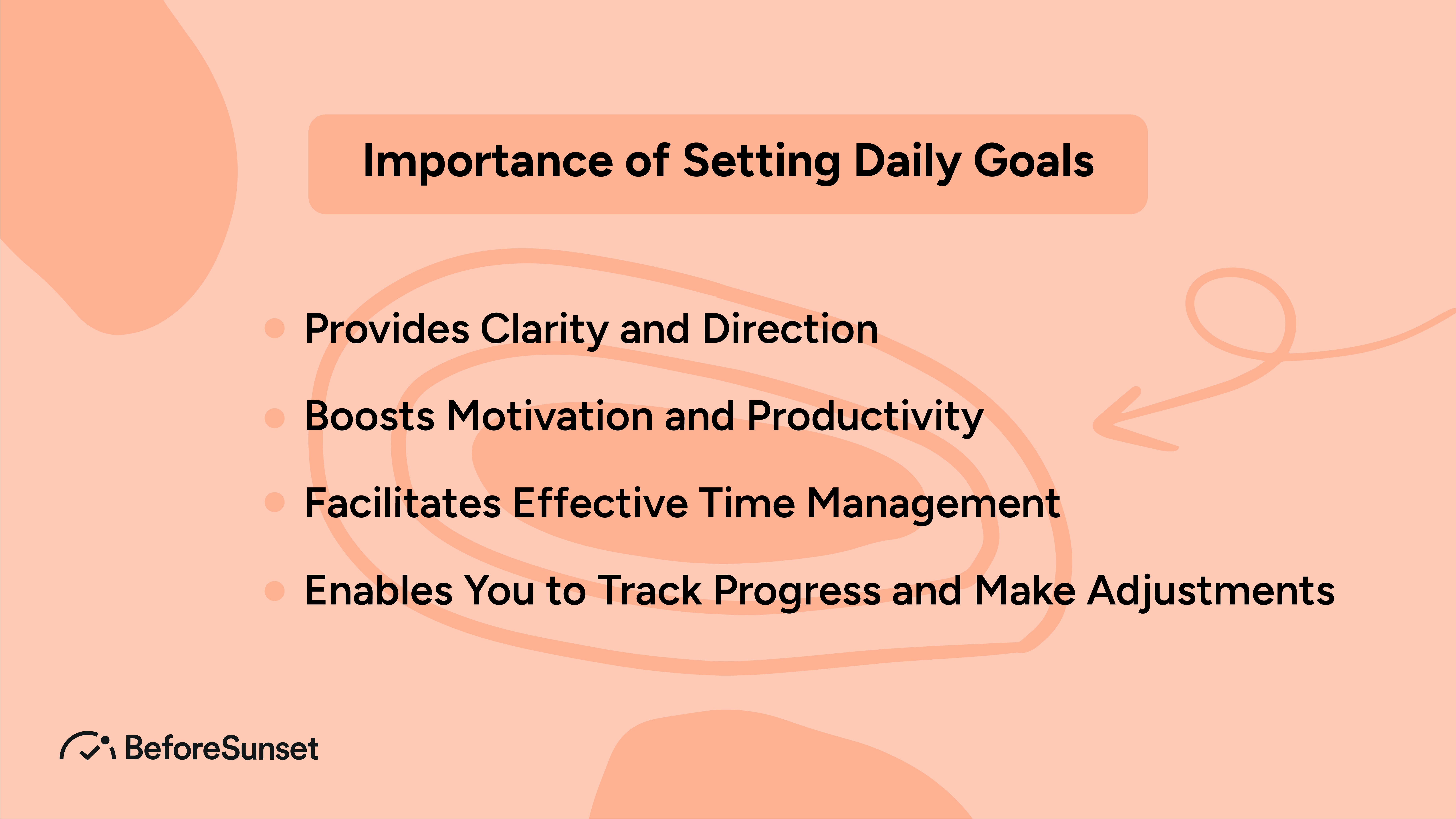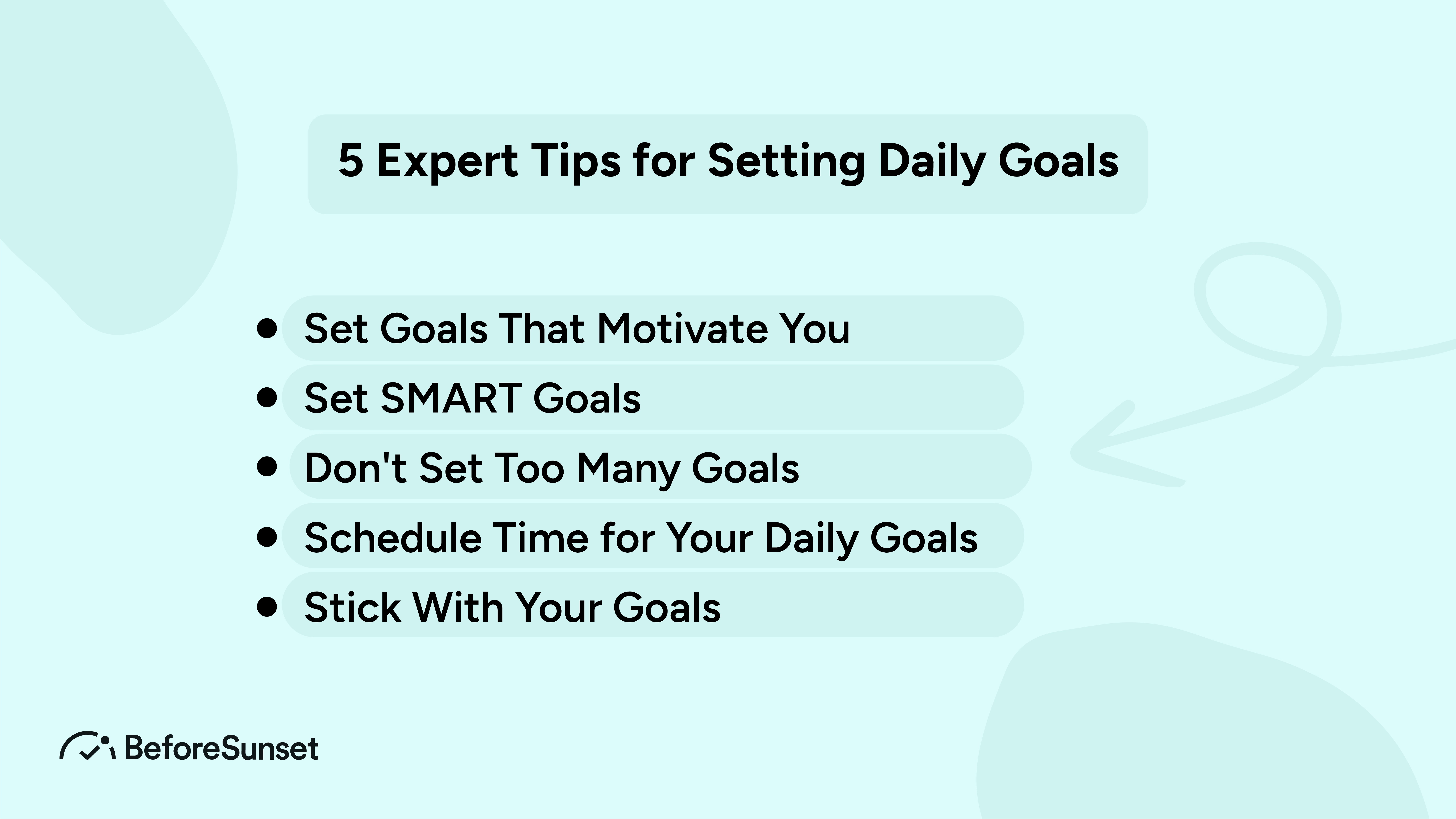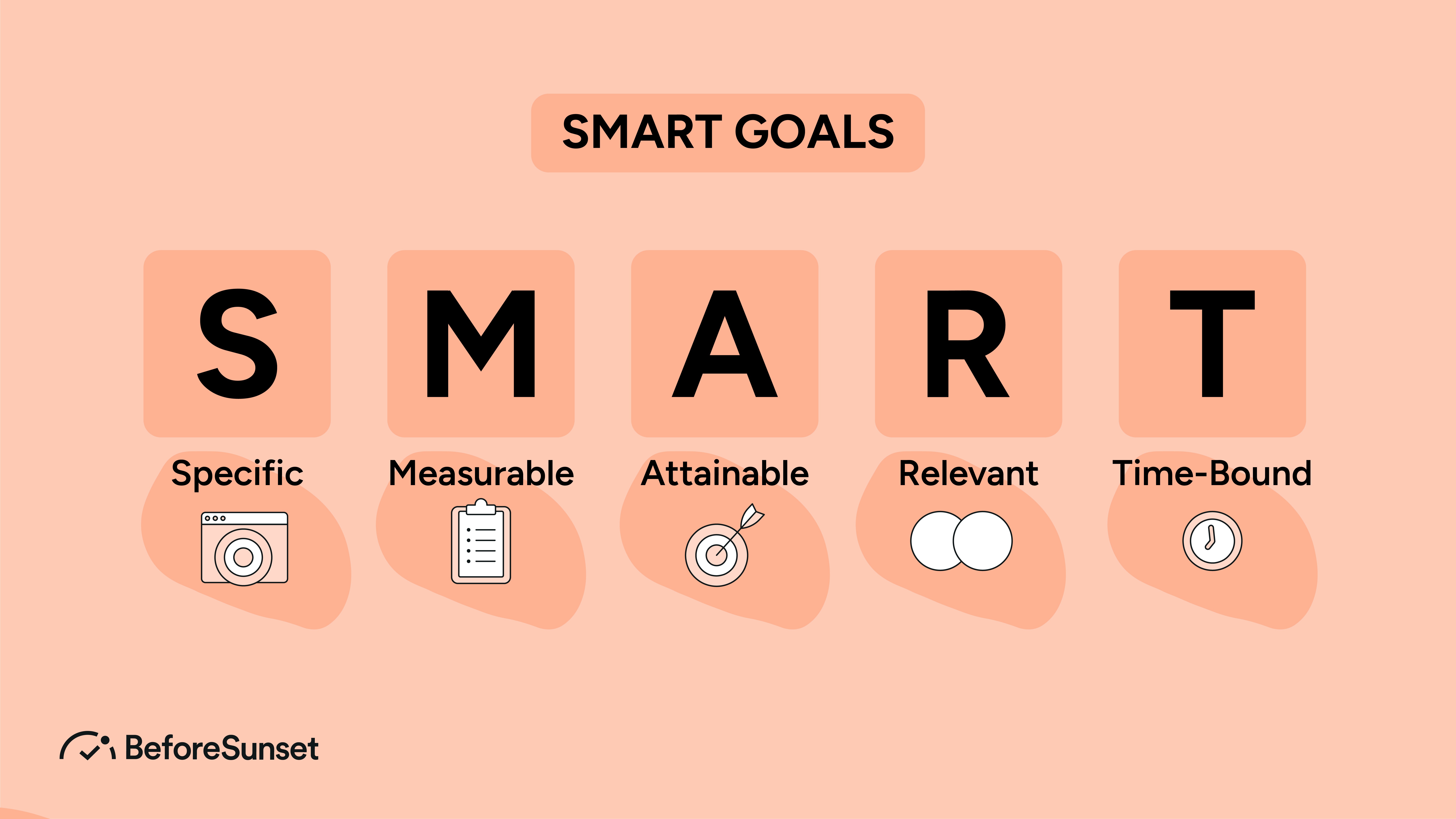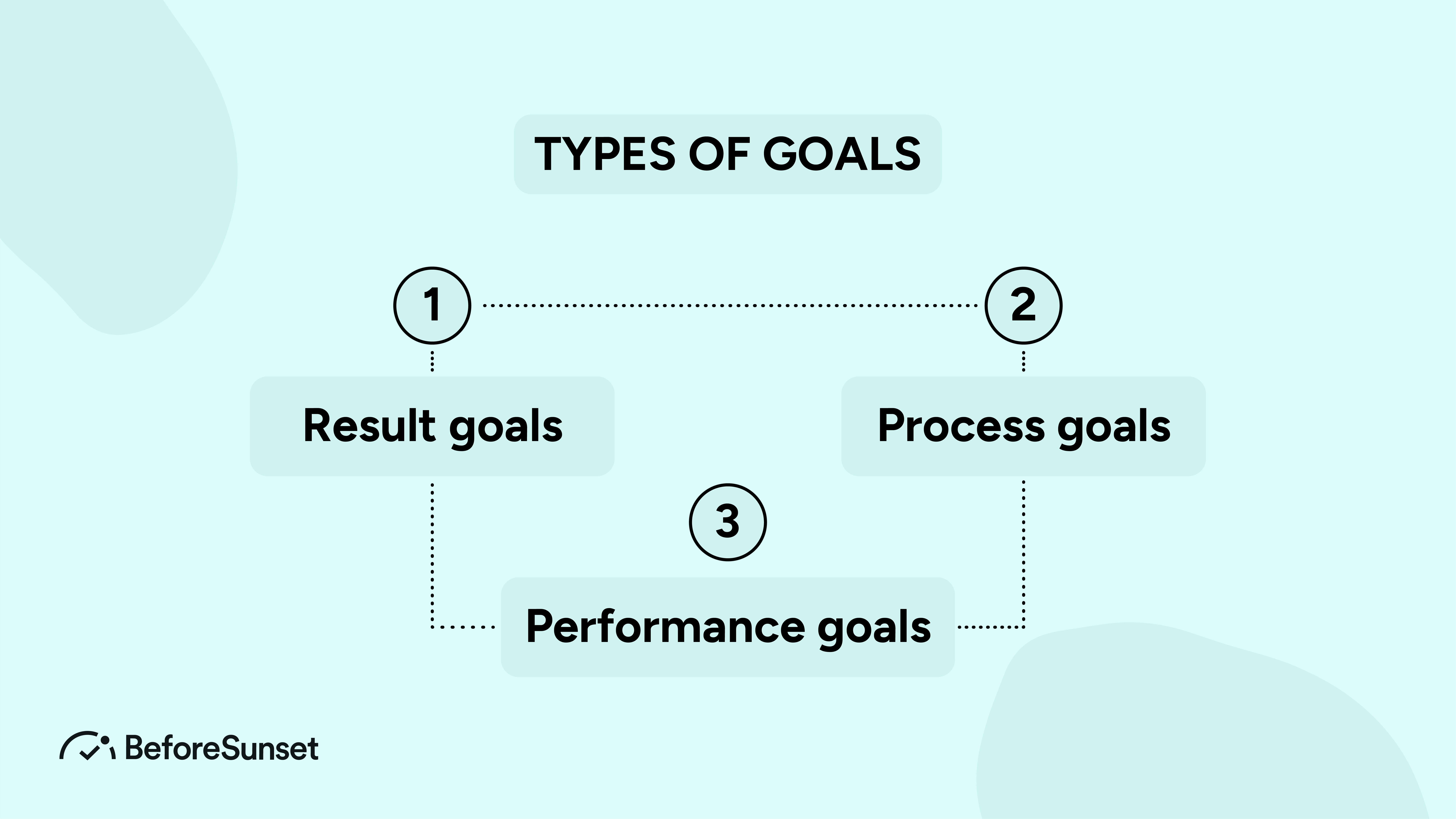Did you know people who set daily goals are 43% more likely to achieve them?
Yes! You've heard it right. This study by Dominican University proves that setting daily goals is not just a good idea but a proven strategy for success.
Daily goals are a powerful tool both for personal and professional growth. So, that's why we've compiled 5 expert tips for you to use both in work and everyday life.
“Setting goals is the first step in turning the invisible into the visible.”- Tony Robbins

Importance of Setting Daily Goals
Every one of us has goals and dreams we hope to achieve. To make these goals a reality, though, you'll need more than a desire. To do anything worthwhile, one must have a strategy and a set of rules to stick to. That's why setting daily goals is crucial.
Here are some reasons why setting daily goals is essential:
Provides Clarity and Direction
Setting daily goals helps you develop a clear path to your desired outcomes. This gives you a sense of purpose and direction, giving you a greater knowledge of where you want to go and what you want to accomplish.
Boosts Motivation and Productivity
When you have a clear plan of action, you are more likely to stay focused and motivated to achieve your goals. Additionally, ticking off completed tasks from your to-do list can give you a sense of accomplishment and satisfaction, which further boosts motivation.
Facilitates Effective Time Management
One of the biggest benefits of setting daily goals is that it can help you manage your time effectively. By prioritizing your tasks and breaking them down into smaller steps, you can ensure that you're spending your time on what matters the most.
Enables You to Track Progress and Make Adjustments
Daily goal setting provides a framework for tracking your progress and making adjustments as needed. By regularly evaluating your goals, you can identify what's working and what's not, and make adjustments to stay on track toward achieving your desired outcomes.

5 Expert Tips for Setting Daily Goals
Just because you want to learn how to set daily goals doesn't mean it will happen overnight. Understanding what goals work best for you requires effort and self-awareness.
Here are 5 golden rules, or rather say: expert tips, to consider before you sit down to write your first set of daily goals and work to achieve them:
Set Goals That Motivate You
Having goals that are meaningful and worthwhile to you can help keep you motivated to work toward them. If you don't care much about the results or if they don't matter in the grand scheme of things, you probably won't put in the effort necessary to make them happen. Having the drive to succeed is essential.
Set goals that relate to the high priorities in your life. Without this kind of concentration, it's easy to spread yourself too thin among too many goals.
Think about how accomplishing your objective will improve your life. Think about how it will benefit you and how well it will fit in with your values and goals. This will strengthen your emotional investment in the outcome and propel you forward in your efforts.
Example:
Let's imagine you want to get healthier and fitter but you're not especially interested in working out for the sake of it. But you're an avid hiker who wants to give yourself a serious test by tackling a treacherous trail you've been eyeing with envy.
Here, you can decide to challenge yourself by scheduling a hike along that path in the next three months. You may need to work on your cardiovascular health, strength, and endurance to accomplish this.

Set SMART Goals
Setting goals is essential to achieving success, but not all goals are created equal. That's where the SMART method comes in.
Specific.
Measurable.
Attainable.
Relevant.
Time-Bound.
Use concrete metrics to track your progress and adjust your goals as needed. You can also share your goals with a supportive friend, family member, or colleague to increase accountability and encouragement.
Example:
Let's say your daily goal is to go for a run. Here's how you can apply the SMART framework to make your goal more effective:
Specific: Instead of simply expressing you want to go for a run, be precise about how far or how long you want to go. "I want to run for 30 minutes" or "I want to run 3 miles,"
Measurable: Ensure that your goal is measurable by using a fitness app or tracking device to record your progress.
Attainable: Your goal should be doable. Starting with something manageable, like 10 minutes of running, and building up from there can be a good strategy for beginners.
Relevant: A daily run is an important part of marathon training, but it may not be necessary for someone who isn't interested in long-distance running to achieve their fitness goals.
Time-bound: "I want to run for 30 minutes every day for the next month, so I need to set a definite time frame for myself." You'll be more accountable to yourself and more likely to actually make headway toward your objective if you do this.
Don't Set Too Many Goals
It can be tempting to set a long list of daily goals. However, it's essential to remember that setting too many goals can actually be counterproductive.
It may be 6 daily goals in your situation, and maybe 4 would satisfy another. What's important is that, instead of trying to achieve everything, you should focus on a few important things each day that lead you closer to your ultimate goal.
Example:
Trying to finish a large work project, going to the gym for an hour, cooking a new recipe for dinner, cleaning the entire house, and spending quality time with friends or family all in one day is actually setting too many daily goals in one day.
Due to the difficulty in prioritizing and keeping track of so many duties, this might cause feelings of being overburdened and stressed. Instead, it may be more beneficial to choose a few high-priority goals for the day and focus on accomplishing them with intention and purpose.

Schedule Time for Your Daily Goals
Knowing what you want to accomplish each day isn't enough; you also need to carve out time for it. One effective strategy is to incorporate time blocking into your daily routine. This involves scheduling every task, including your daily goals, on your calendar.
According to a study, time blocking is the most common time management system productive people use (5%), followed by the Rapid Planning Method (3%) and the Eisenhower Matrix at 2%.
You want your personal daily goals to get the attention they deserve as much as your work-related goals. Using a calendar that is designed both for your goals helps ensure that nothing is missed out.
BeforeSunset is a mindful productivity tool to help you manage both personal and professional goals. You can:
Analyze yesterday's progress and manage your today's daily goals.
Keep track of your team's daily goals.
Evaluate your and your team's productivity and make adjustments according to the outputs.

Example:
Let's say one of your daily goals is to practice French for 30 minutes every day. You can block off 30 minutes each morning before work or school to practice French. During this time, you can listen to French music, review vocabulary with flashcards, or even speak with a language exchange partner.
Stick With Your Goals
To stay on track with your daily goals, make them an ongoing activity rather than a one-time event. Your action plan may need to change along the road, so make sure to constantly assess the relevance, value, and need of your goals.
Keep in mind that while the final target may remain the same, the method to get there may necessitate changes. You can reach your daily goals and feel more accomplished and progress if you stay dedicated to the process and make the required changes.
Example:
Maybe you'd like to give the violin a try. It's a good one, but you have to stick with it. It's possible that you'll have to adjust your study schedule or put in more time on a certain ability before it becomes second nature.
Remember, the journey of learning an instrument is a long one, but sticking with your goals can lead to a great sense of accomplishment and joy in playing beautiful music.

Types of Daily Goals
Setting daily goals can be an effective way to achieve your larger goals. You can set daily goals of several types, such as:
Result goals
Process goals
Performance goals
Result or Outcome Goals
Outcome goals concentrate on the end goal, such as completing a project or meeting a deadline. If you want to complete a project by the end of the day is an example of an outcome goal. You may have specific activities to accomplish in order to achieve this goal, but the emphasis is on the end outcome.
Process Goals
Process goals involve the steps you must take in order to reach your outcome goals, such as spending a specific amount of time on a task or reading a specific number of pages.
Performance Goals
Performance goals involve improving your skills or abilities, such as practicing a specific skill or learning a new technique.

How Do Daily Goals Help Long-Term Goals?
When you focus on small daily goals, you're actually paving the way to achieve your long-term goals. With the momentum you get from your daily goals, you stay motivated and committed. But when you can't find the motivation, you may need a helping hand to get through the day.
The mix of BeforeSunset and your daily goals act as a stepping stone to help you get your work done. It sometimes becomes hard to keep track of everything. You sometimes just want to plan your day and enjoy watching the sunset without thinking much about the work.
Believe me, it's possible! Join the waitlist now and enjoy the perks of mindful productivity!


